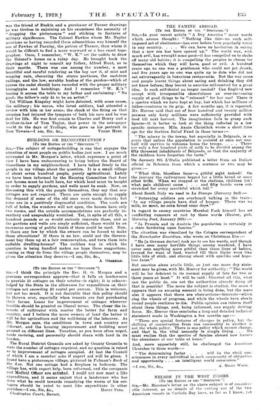THE FAMINE ABROAD.
(To THE Benoit or cm "13Ptell.S08.1
Sea,—In your recent article " A Dry America" occur words which arouse thought: "Nothing like this—no such self- imposed act of abstinence—has ever before been popularly voted in any country. . . . We can have no hesitation in saying that a new era has been opened up." The world war, with much evil, has wrought some good—it has compelled us to shake off many old habitat it is compelling the peoples to choose for themselves which they will have, good or evil. A hundred years ago no one was a gentleman who could not get drunk, and five years ago no one wee quite up to date who did not eat extravagantly in luxurious restaurants. But the war came and people learnt things about eating and drinking they did not know before; they learnt to exercise self-control for a great idea. Is such self-denial no longer needed? Can England now accept with irresponsible cheerfulness an ever-increasing supply of good things to be " released " for her use? There is a spectre which we have kept at bay, but which has iniltions of fellow-creatures in its grip. A few months ago, it is reported. Mr. Hoover said that out of four hundred and twenty million persons only forty millions were sufficiently provided with food till next harvest. The imagination fails to grasp such figures—it is better to look at the thing reflected in a few specific instances. Mlle. Annie Chriatitch wrote a short time ago for the Serbian Relief Fund in these terms:— " The misery in the towns, but especially in Belgrade, is es acute that unless the population is assisted at once not one- half will survive to welcome home the troops. . . . There ere only a few hundred pints of milk to be divided among the fifty thousand inhabitants of Belgrade, so that the majority of the children have forgotten the taste."
On January eth published a letter from an Italian official in Bohemia from which a sentence or two may be given:— " What thin, bloodless faces—a pitiful sight indeed! On the journey the railwaymen begged for a little bread or some other trifle. When we Mopped at the stations. children (oh!
what pale children) came . . and fifty hands were out- stretched for every mouthful which fell."
About South Italy we read in La Stamps (January 2nd) " Returning soldiers are overheard talking in the train: 'In my village people have died of hunger. There was na milk, no meat, no corn bread some days.'" In regard to enemy countries Marshal Fooh himself has set conflicting rumours at rest by these words (Reuter, pub. Morning Post, January 20th) :- "In Prussia and in Austria the population is certainly in a state bordering upon famine."
The situation was visualized by the Cologne correspondent of the Manchester Guardian, who wrote on Christmas Eve:— " He [a German doctor] took me to see his wards, and though I have seen many horrible things among mankind, I have never seen anything more pitiful than those lines of babies. fevered for want of food, wasted till their limbs were like little bits of ;tick, and staring about with ape-like and hope- less faces."
But emotion alone avails little, so just one more dry state- ment may be given, with Mr. Hoover for authority " The world will be far deficient in its normal supply of fate for two or three years at least." It will be said Granted all this, what can the public do, are not the authorities already doing all that is possible? The more the subject is studied, the more it appears that an amasing amount is being done, but the more also it appears that there are obstructions—Interests—which clog the wheels of progress, and while the wheels turn slowly round people continue to die. Public, opinion can inform itself about these things, and, being informed, can supply driving- force. Mr. Hoover thus concludes a long and detailed technical statement made in Washington a few months ago:—
" These are special features of changes in policy, but the shifting of conservation from OHO commodity to another is not the whole policy. There ie one policy which cannot change. and that is, the vital necessity ie simple living.... We meat realize that the epectre' of famine abroad now haunts the abundance of our table at home."
And, more appositely still, he challenged the American Churches in these words:— " The determining factor . . . will be the vivid con- sciousness in every individual in each community of obligation and opportunity . . an intelligent world conscience."


































 Previous page
Previous page